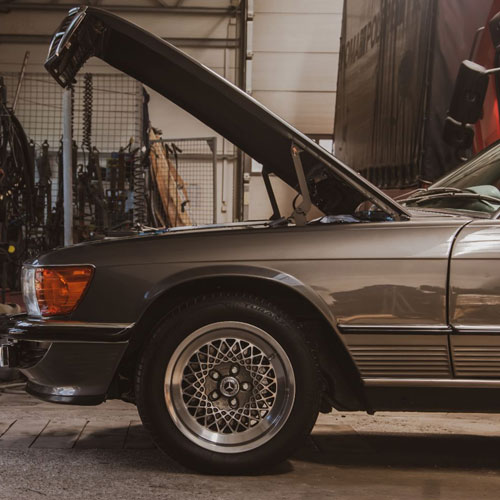- +91 8586 82 4525
- email@prodyovidhi.com
Industries Served / Automotive & Transportation

Automotive & Transportation refers to the industries involved in the design, manufacturing, and distribution of vehicles, as well as the systems that move people and goods.
The Automotive and Transportation industries are key pillars of the global economy, facilitating the movement of people, goods, and services. These sectors are closely related, with automotive being a significant component of the broader transportation industry. Below is an overview of both industries, including trends, challenges, and future outlooks.
The automotive industry focuses on the design, development, manufacturing, and selling of motor vehicles. It encompasses a variety of vehicle types and services, including cars, trucks, motorcycles, and other motorized transport. Major components of the automotive industry include:
Vehicle Manufacturing: The production of different types of vehicles, including:
Original Equipment Manufacturers (OEMs): Companies like Toyota, Ford, BMW, and Tesla that produce vehicles and components.
Aftermarket Services: This sector includes the production and sale of parts, accessories, and services like vehicle maintenance, repairs, and enhancements (tires, batteries, lubricants, etc.).
Autonomous Vehicles: Development of self-driving cars and trucks, which use advanced sensors, machine learning, and AI technologies to navigate without human input.
The transportation industry is broader and involves the movement of goods, services, and people across various modes of transport, including land, sea, and air. The key areas of the transportation sector are:
Road Transport: Vehicles such as cars, trucks, and buses that move people and goods along roads. This includes both private vehicles and public transportation systems (e.g., city buses).
Rail Transport: Trains that move passengers and freight over long distances. Rail networks play a critical role in both passenger travel (metro, high-speed trains) and logistics (freight trains).
Air Transport: Airlines and aircraft transport people and goods across countries and continents. Air transport includes commercial aviation (passenger flights) and air cargo services.
Maritime Transport: Ships and boats that move goods and passengers across seas and rivers. This includes commercial shipping (container ships, tankers) and passenger services (ferries, cruise ships).
Logistics and Freight: Involves the management and coordination of goods being transported, warehousing, and distribution across all transportation modes.
The automotive and transportation industries are undergoing rapid transformations driven by technology, sustainability, and consumer preferences. Key trends include:
Electrification: The shift toward electric vehicles (EVs) is one of the most significant changes in the automotive sector. As concerns about climate change and emissions grow, governments and automakers are investing in EV technology. Companies like Tesla, Nissan, and Volkswagen are leading the charge, while legacy automakers are transitioning to hybrid and fully electric models.
Autonomous Driving: Self-driving or autonomous vehicle technology is evolving rapidly, with companies like Waymo, Tesla, and traditional automakers developing vehicles that can operate with minimal or no human input. Autonomous trucks are also being tested for logistics and freight, offering a potential revolution in supply chain management.
Shared Mobility: Ride-hailing services like Uber, Lyft, and Grab have transformed urban transportation, offering consumers alternatives to owning a personal vehicle. Shared electric scooters and bikes are also becoming popular in urban areas.
Connected Vehicles: Advances in Internet of Things (IoT) technology are making vehicles more connected. Modern cars are equipped with features like real-time navigation, vehicle-to-vehicle (V2V) communication, and over-the-air software updates. This connectivity enhances safety, efficiency, and the overall driving experience.
Sustainable Transportation: Both industries are prioritizing sustainability, with efforts to reduce greenhouse gas emissions, develop fuel-efficient and electric transportation options, and implement eco-friendly public transportation solutions (e.g., electric buses and rail).
Mobility as a Service (MaaS): MaaS integrates different forms of transportation into a single accessible platform. With MaaS, users can plan, book, and pay for transportation (from buses to bikes to ride-hailing services) through one app or service, encouraging multimodal transportation and reducing reliance on personal cars.
Supply Chain Disruptions: The COVID-19 pandemic and geopolitical events have disrupted global supply chains, particularly for automotive manufacturers, affecting the availability of critical components like semiconductors. This has led to delays in vehicle production and increased prices for consumers.
Rising Costs: Fluctuating costs of raw materials (steel, aluminum, and lithium for batteries) have pressured automakers and transport companies. The increasing cost of fuel, maintenance, and technology investment also impacts profitability, especially in logistics and transportation.
Regulation and Policy: Governments worldwide are implementing stricter regulations regarding vehicle emissions, safety standards, and alternative energy adoption. While these policies promote sustainability, they also impose significant costs and operational challenges for manufacturers.
Infrastructure Needs: The shift to electric vehicles requires significant investments in charging infrastructure. Similarly, autonomous driving technology will require cities and countries to update road systems and safety regulations to accommodate new technologies.
Labor Shortages: The transportation industry, particularly in logistics and trucking, is facing labor shortages. The growing demand for e-commerce and the increasing pressure for fast delivery services has exacerbated the issue, with companies struggling to find qualified drivers.

At ProdyoVidhi, our aim is to help businesses in managing and create intellectual property (IP) and provide comprehensive IP solutions for every aspect of conducting business in the knowledge economy.
C165 Sarvodaya Enclave New Delhi 110017 INDIA
101 Tilak Path CMR Point #101 INDORE 452007 INDIA
